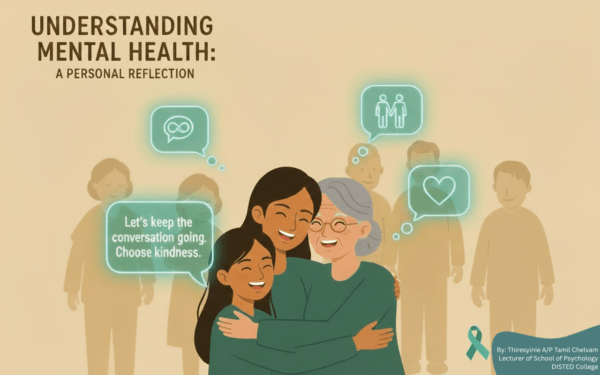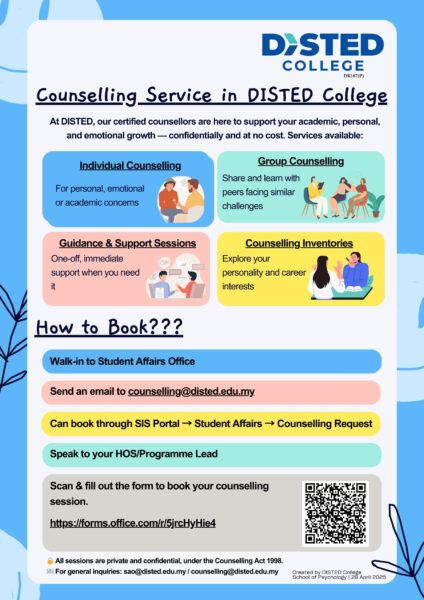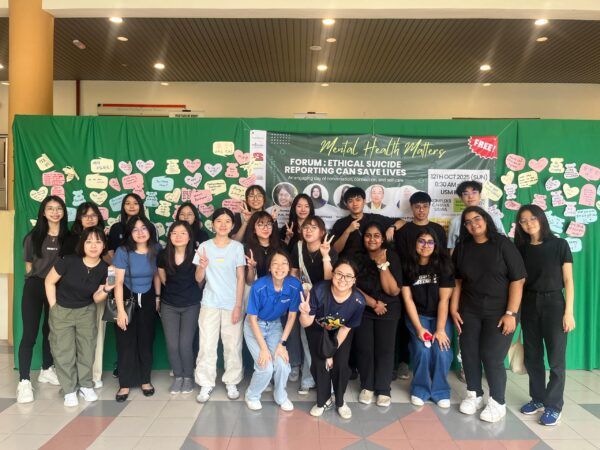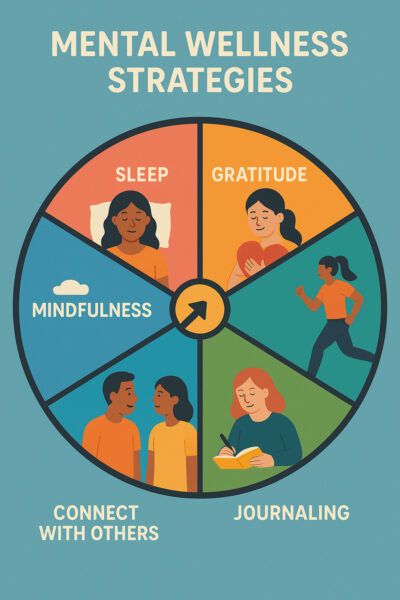Managing Emotions and Mental Health at DISTED
At DISTED College, mental health is a priority. During our recent Deepavali celebration at Heritage Hall, we reflected on the achievements of our staff and their role in supporting students.
With increasing reports of mental health challenges among youth, our commitment to fostering emotional resilience has never been stronger. The School of Psychology has been at the forefront of this effort, developing programs and interventions that promote awareness and provide practical support. Students have access to counseling services and resources designed to help them navigate stress and maintain balance. Our academic leaders are also integrating mental health education into campus activities, ensuring that emotional well-being becomes part of the learning experience.
This week’s issue is dedicated to mental health because nurturing the mind is essential for thriving in today’s world.
President,
Dato’ Lim Si Boon
My Mental Health Story & Journey
“Why me? I do not understand.”
When I was 12, I lost not just all my hair to alopecia universalis but also a piece of myself, starting a lifelong struggle, unknowingly then, with depression.
Sheer willpower got me through high school, college, university, and early work life until six years ago when the ticking time bomb exploded and everything fell apart. I was officially diagnosed with double depression (MDD and PDD). Hitting rock bottom, it took three years to heal and get back to work in 2022.
It is 2025 now. Having come to terms with it, I left the corporate world and pivoted to Psychology. Mental health had become something so raw yet so personal that I decided I wanted to help those like me navigate through the difficult challenges that come with mental health.
This journey has been very meaningful so far. While preparing academically here, I have also been actively involved as a careline volunteer in Befrienders Penang for over a year now, providing emotional support to the despairing. Adding on was the opportunity to design and facilitate their Safe Room (a space for those with mental health lived experiences) during their 2025 World Mental Health Day event in USM. These experiences of being able to hold space for others now brought me almost full circle to when I once needed it the most.
I finally found that lost piece of myself. It did not simply return; it may have been the answer to the very question of “why” that I asked as a child. Today, I hope to help build a better narrative around mental health in Malaysia, especially considering the stigma that still surrounds it.
For the 12-year-old Kyle who cried “why,” for the younger adult Kyle who almost gave up, and for everyone still finding their way through the dark for the light at the end of the tunnel.
I used to survive life through sheer will, but now I live life with my heart, one beat at a time.
Kyle Chan Wei Ren,
Student, Bachelor of Psychology
Understanding Mental Health: A Personal Reflection

Mental health has always been a deeply personal topic for me. My grandmother has lived with schizophrenia for more than fifty years, and my mother continues to struggle with anxiety. Growing up in this environment, I witnessed the quiet battles that individuals face when their minds become their hardest challenge. These struggles are not always visible, but they shape how a person feels, behaves, and connects with others every single day.
Through these experiences, I learned that mental illness does not only affect the individual. It affects the entire family, the community, and the conversations we have or sometimes avoid. What often hurts the most is not the illness itself, but the lack of understanding and awareness from those around us. Misconceptions and stigma still lead to distancing and isolation, when what people truly need is empathy, patience, and kindness.
Over the years, I have come to realise how important it is to talk about mental health, openly, honestly, and without shame. Whether it is through sharing stories, checking in with a friend, or simply offering a listening ear, every small act helps break the silence and stigma. We never know what battles others are quietly fighting, so it is always better to choose compassion over judgment.
I hope that through continuous awareness and education, our community will grow more supportive and inclusive, where no one feels alone or misunderstood because of their mental health struggles. Kindness costs nothing, but it can mean everything to someone who is struggling.
Let us keep the conversation going, especially during this Mental Health Month.
Thiresyinie A/P Tamil Chelvam,
Lecturer, School of Psychology
You Matter: A Message on Mental Health

Sometimes, we smile and tell others we are fine. But inside, many of us carry silent battles that go unseen. Deadlines pile up, friendships change, family expectations feel overwhelming… and somewhere along the way, we forget to care for ourselves.
It is okay to pause.
It is okay to feel tired, confused, or lost.
And it is okay to ask for help.
Mental health is not about being happy all the time. It is about finding balance, learning to breathe again, and knowing that it is safe to reach out when life feels heavy.
At DISTED, we believe that no one should walk this journey alone. Our counselling services are here to provide a safe, confidential space for students and staff to talk, reflect, and heal.
Let us remember that seeking help is a sign of strength, not weakness. You are not alone. Support is available, and your well-being matters.
Chew Yong Peng
Lecturer and Counsellor, School of Psychology
Promoting Mental Health Awareness

On 12 October 2025, I had the privilege of accompanying my students to the Mental Health Matters: Ethical Suicide Reporting Can Save Lives forum, hosted by Befrienders Penang at USM Penang. The event was supported by NCEMH, YH, and MOF, and was held in collaboration with Unit Kaunseling USM.
The forum brought together a panel of professionals who shared valuable insights on ethical suicide reporting. Speakers included Mr. Arnold Loh (Senior Journalist), Dr. Ng Yin Ping (Psychiatrist, Pantai Hospital), Madam Saras Pillay (Chairperson, Befrienders Penang), Puan Mediha Mahmood (Chief Executive Officer, Content Forum), and Associate Professor Dr. Nor Shafrin (Moderator). Their discussions emphasized how responsible journalism can help prevent suicide contagion and foster empathy and awareness in society.
Beyond the talks, students participated in a Laughter Yoga session, which promoted emotional well-being through movement and shared laughter. This interactive segment encouraged self-care and highlighted the importance of joy in mental health recovery.
The event provided students with a deeper understanding of mental health advocacy and the critical role of communication, compassion, and ethical responsibility in supporting individuals in distress.
Teoh Ker Hsin,
Program Leader, School of Psychology
Caring for Your Mind and Heart

In today’s fast-paced and demanding world, mental health has become a growing concern, especially among students and young adults. Many face increasing stress from academic responsibilities, social expectations, and the constant pressure to succeed. The rise of social media and digital lifestyles has also made it easier to compare ourselves with others, often leading to feelings of anxiety or low self-worth.
Mental wellness is now at the heart of many school and community conversations because it directly influences how we think, learn, and interact with others. Taking care of mental health does not always require drastic changes. Small, consistent actions can have a lasting impact. Practising mindfulness helps us stay present and calm. Regular physical activity supports both mental and physical well-being. Adequate rest allows the brain to recharge, and meaningful connections with friends and family remind us that we are not alone.
These strategies can help reduce stress, boost self-confidence, and improve overall happiness. When we make mental wellness a priority, we contribute to a more compassionate and supportive environment, not just for ourselves, but for everyone around us.
Let us continue to promote mental health awareness and encourage kindness, empathy, and understanding in our communities.
Ambalakalidachayini Devi A/P Ravi,
Lecturer, School of Psychology
Mental Health: Breaking the Myths and Embracing Support

Mental health plays a vital role in helping individuals cope with stress, build relationships, and live fulfilling lives. Despite its importance, many myths continue to surround it.
Some people think that mental health struggles are a sign of weakness. In reality, asking for help is a courageous and strong decision. Therapy is not limited to those with severe conditions. It can support anyone who is navigating stress, relationships, or personal growth.
Even if someone has managed emotions alone in the past, it is still valid to seek help now. Mental health is not fixed. It changes over time, and support can make a difference. Seeking help does not always mean taking medication. Treatment is personal and varies from one individual to another.
Mental health deserves the same care as physical health. Early support leads to better outcomes and long-term resilience.
DISTED students are encouraged to speak with school counselors or mentors during mentor-mentee sessions.
Nurshakirin Binti Sulaiman
Lecturer, School of Pre University

